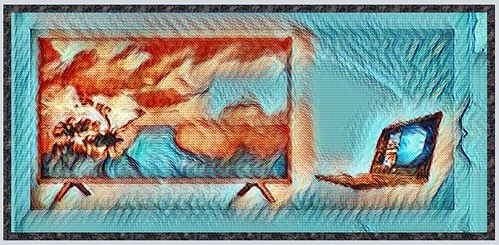Bernie Sanders’ campaign has finally gone full-throat with the
obvious: the Democrat-aligned corporate media have thrown all
journalistic principles to the wind to impose a “Bernie Blackout.”
How can someone who was the most popular politician in the nation in 2017 be made into a non-person? It’s all intimately entwined with the multiple crises afflicting late stage capitalism.
In the absence of massive, grassroots movements, corporate voices
always drown out all the others. Capitalist ownership of the media
allows the rich to frame their own worldview as the political “center,” thus
relegating contending ideologies to the “extremes” of left or right. In
this sense, “centrism” is nothing more than the political position of
the corporate owners, who construct media versions of reality that make
corporate-concocted policies seem the most logical, commonsensical and
socially responsible approach to the world’s problems. As long as the
rich can sustain broad public trust in the “truth” of their
“journalistic” products -- newspapers, electronic newscasts, books and
other media created by professional operatives directly answerable to
rich owners – widespread revolt against the corporate order is
unlikely.
Most people in all societies want to be perceived -- and to see
themselves -- as sensible, responsible and knowledgeable. When polled on
political questions, they are eager to give the “correct”
(corporate-endorsed) answers. Only the most marginalized, alienated and
systematically demonized sectors of society will consistently buck the
corporate narrative. In the United States, the biggest historical
resistance to the corporate (rich white man’s) worldview has come from
Black America, a besieged people with a unique social perspective who
were compelled to create their own media in desperate defense of their
collective humanity. However, the demise of Jim Crow apartheid and
subsequent absorption of many of the “best and brightest” Black minds
into corporate service, has dulled Black defenses. After two generations
without a mass, grassroots Black movement – a politically desolate
period briefly interrupted by the “Black Lives Matter” mobilizations of
2014-15 -- African Americans are also more likely to give the “correct”
answers to corporate media surveys.
But not the youth of all races, who know that capitalism, as
they experience it, promises them nothing but endless austerity and
war. Majorities of young Americans now embrace a version of “socialism”
that is actually merely a less vicious capitalism, made kinder by a
comprehensive system of social supports – similar to the “social
democratic” order in northwestern Europe. But late stage capitalism is
relentlessly eviscerating the European model and has no intention of
allowing a replica to be erected in the United Corporate States of
America, the global headquarters and armory of the Lords of Capital.
-- Glen Ford, "By trying to Silence Sanders, the Corporate Media De-Legitimize Themselves" (BLACK AGENDA REPORT).
An accumulation of frustrations about the lack of progress in the
last 16 years is clearly perceptible, and with rising numbers of deaths
and injured (both protesters and members of the Iraqi Security Forces) a
climate of anger and fear has set in. The Iraqi people cannot afford to
be held back by the past nor by partisan interests. Rising hope asks
for a leap forward, including the understanding that - in today’s
digital age - daily life has moved online. Meanwhile, the risk of
‘spoilers’ hijacking peaceful demonstrations is increasing and
potentially derailing any attempt at genuine change. Time is therefore
of the essence, as are tangible results.
To start with, and following consultations with a wide range of Iraqi
parties, actors and authorities (including the three Presidencies, the
Supreme Judicial Council, protesters and union representatives), the
United Nations Assistance Mission for Iraq (UNAMI) proposes the
following principles and measures:
PRINCIPLES
The following principles apply to all parties at all times:
1. Protect the right to life above all.
2. Guarantee the right to peaceful assembly, demonstration and freedom of expression,
as granted in the constitution.
3.
Practice maximum restraint in the handling of the protests, including
no use of live ammunition, ban the improper use of non-lethal devices
(such as tear gas canisters).
4. Deliver full accountability for perpetrators and redress for victims.
5. Act in keeping with the law, including in regard to public and private properties.
MEASURES
Immediate measures (less than a week) include:
1. Release all peaceful demonstrators detained since 1 October, in accordance with the law.
2. No peaceful demonstrators shall be targeted.
3.
Initiate full investigation of cases of abduction (including by making
available CCTV footage), and reveal the identity of those responsible.
4. Accelerate the identification and prosecution of those responsible for targeting demonstrators.
5. Prosecute and punish those responsible for the excessive use of force and/or other violent acts, in accordance with the law.
6.
Publicly call on all regional and international parties not to
interfere in Iraq’s internal affairs, respecting its sovereignty.
Short term measures (within one week to two weeks) include:
1. Electoral reform: With the technical support of the UN, a single
legal framework shall be finalized. Soon after, the framework shall be
submitted to the Council of Representatives (CoR). The parliamentary
procedure shall be completed as soon as possible.
2. Security Sector
Reform: Executive Order 237 shall be fully implemented without delay.
Any weapons outside state control shall be prohibited. Any outlaw armed
entity or rogue element shall be considered illegal and it is the
state’s responsibility to take them on.
3. Corruption: The political
elite shall lead by example, for instance by publicly declaring their
assets – at home and abroad, held under their own name or another.
Additionally, political parties/blocs and movements shall abolish their
economic committees.
Medium term measures (within one to three months) include:
1. Constitution: With the technical support of the UN, the
Constitutional Review Committee shall continue its work. Any amendment
to the constitution shall be put to referendum by the people of Iraq.
2.
Corruption: The Commission of Integrity shall submit corruption cases
to the High Judicial Council or the Central Anti-Corruption Court. The
Central Anti-Corruption Court shall handle corruption cases at all
levels of the state. All corrupt officials will be held accountable and
prosecuted.
3. Enactment of laws: The Government shall send the
following draft laws to the CoR, and the CoR shall complete its due
process as soon as possible:
a. A law addressing the principle: ‘Where did you get this from?’
b. The Federal Court Law
c. The Social Security Law
d. Law on resolving the Housing Crisis
e. The Oil and Gas (Hydrocarbon) Law
f. Amending the Law on Encouraging Investments and Public-Private Sector Partnership
g. The Council of Ministers and Ministries Law
h. The Reconstruction Council Law







